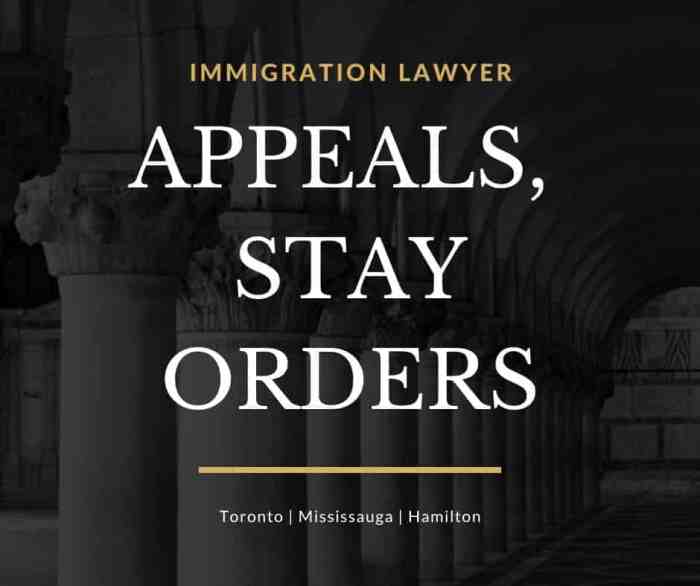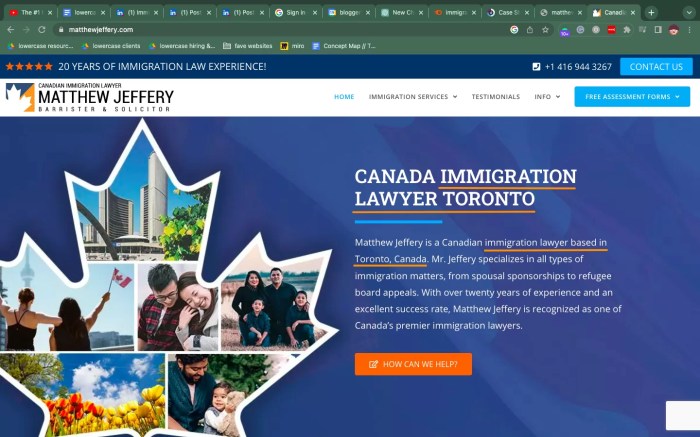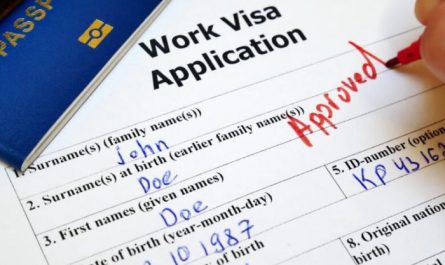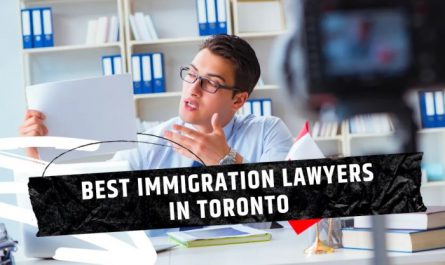Navigating Canada’s complex immigration system can be daunting. The right legal guidance can significantly increase your chances of success, transforming a stressful process into a manageable journey. Choosing the best Canadian immigration lawyer is crucial, as their expertise can make the difference between approval and rejection. This guide explores the key factors to consider when selecting legal representation for your immigration needs.
From understanding the various immigration programs and application processes to navigating potential legal challenges and ensuring ethical representation, we’ll provide you with the knowledge you need to make an informed decision. We’ll examine the qualities of a top-tier immigration lawyer, methods for finding and vetting candidates, and the importance of considering lawyer fees and services. Ultimately, our aim is to empower you to find the best legal advocate to support your Canadian immigration aspirations.
Understanding the Canadian Immigration System

Navigating the Canadian immigration system can seem daunting, but understanding the various programs and processes can significantly increase your chances of success. This section provides an overview of the key pathways and requirements for immigrating to Canada.
Canadian Immigration Programs
Canada offers a diverse range of immigration programs designed to attract skilled workers, family members of Canadian citizens and permanent residents, and refugees. These programs are managed by Immigration, Refugees and Citizenship Canada (IRCC). The primary programs include:
- Express Entry: This is a points-based system for skilled workers. Applicants create an online profile outlining their skills, education, and work experience. Those with high scores are invited to apply for permanent residence.
- Provincial Nominee Programs (PNPs): Each Canadian province and territory has its own PNP, allowing them to nominate individuals who meet their specific labour market needs. Successful nomination significantly increases the chances of receiving a permanent residency invitation.
- Family Sponsorship: Canadian citizens and permanent residents can sponsor eligible family members to immigrate to Canada. This includes spouses, common-law partners, dependent children, and parents/grandparents.
- Refugee and Humanitarian Programs: These programs offer protection to individuals fleeing persecution or violence in their home countries. Applications are assessed on a case-by-case basis, considering factors such as well-founded fear of persecution.
Application Processes for Each Program
Each immigration program has a unique application process. Generally, it involves:
- Eligibility Assessment: Determining if you meet the minimum requirements for the chosen program.
- Document Collection: Gathering all necessary documents, including proof of identity, education, work experience, and language proficiency.
- Application Submission: Submitting the completed application online or by mail, along with the required fees.
- Background Checks: Undergoing criminal and security background checks.
- Medical Examination: Completing a medical examination to ensure good health.
- Processing: Waiting for IRCC to process the application, which can take several months or even years depending on the program and current processing times.
Comparison of Requirements for Various Immigration Pathways
The requirements vary significantly across programs. For example, Express Entry emphasizes points based on factors like education, work experience, language proficiency, and age. Provincial Nominee Programs prioritize candidates who can fill specific labour market needs within a province. Family sponsorship focuses on the relationship between the sponsor and the applicant. Refugee and humanitarian programs assess the applicant’s risk of persecution in their home country.
Examples of Successful Immigration Cases and Their Strategies
One successful case involved a software engineer who used the Express Entry system. By highlighting extensive work experience, a high IELTS score, and a strong job offer from a Canadian company, they accumulated a high Comprehensive Ranking System (CRS) score, leading to an invitation to apply for permanent residency. Another successful case involved a skilled tradesperson who secured a provincial nomination through a PNP, demonstrating a strong need for their skills in a specific region of Canada. These cases illustrate the importance of tailoring your application to the specific requirements of the chosen program and showcasing your strengths effectively.
Qualities of a Top Immigration Lawyer
Navigating the complexities of Canadian immigration law requires expertise, experience, and a commitment to client success. Choosing the right lawyer can significantly impact the outcome of your application. This section Artikels the essential qualities that distinguish a top-tier immigration lawyer from the rest.
Effective immigration law practice demands a unique blend of legal acumen, practical skills, and personal attributes. A successful lawyer needs a deep understanding of Canadian immigration legislation, regulations, and policies, keeping abreast of constant changes and updates. This understanding must be coupled with strong analytical skills to assess individual cases, identify potential challenges, and develop effective strategies. Furthermore, exceptional organizational skills and meticulous attention to detail are crucial for managing complex applications and meeting stringent deadlines.
Professional Certifications and Memberships
Professional certifications and memberships demonstrate a lawyer’s commitment to upholding high standards of practice and ongoing professional development. Membership in organizations like the Canadian Bar Association (CBA) and relevant provincial law societies signifies adherence to ethical codes and continuing legal education requirements. Specialized certifications in immigration law, such as those offered by the Canadian Immigration Lawyers Association (CILA), further validate a lawyer’s expertise and dedication to the field. These certifications often involve rigorous examinations and demonstrate a deeper understanding of the intricacies of immigration law. For example, a lawyer certified by CILA has undergone a comprehensive assessment of their knowledge and experience, assuring clients of a higher level of expertise.
Client Communication and Case Management
Effective communication is paramount in the lawyer-client relationship. A top immigration lawyer maintains open and transparent communication, providing regular updates, promptly addressing client inquiries, and explaining complex legal concepts in clear and accessible language. Proactive case management involves meticulous organization, detailed record-keeping, and the timely submission of all necessary documentation. A well-managed case minimizes delays and increases the chances of a successful outcome. For instance, a lawyer might use a specialized case management software to track deadlines, documents, and communication with clients and government agencies, ensuring a streamlined and efficient process.
Checklist for Selecting an Immigration Lawyer
Choosing the right immigration lawyer is a crucial decision. Consider the following checklist when making your selection:
Before making a final decision, it is vital to thoroughly research potential lawyers. Check online reviews and testimonials, contact past clients to gather firsthand accounts of their experiences, and verify the lawyer’s qualifications and memberships with relevant professional organizations. This due diligence ensures that you select a lawyer who aligns with your needs and expectations, ultimately maximizing your chances of a successful immigration outcome.
- Years of experience in immigration law.
- Proven track record of successful cases.
- Membership in relevant professional organizations (e.g., CBA, CILA).
- Strong communication skills and responsiveness.
- Clear fee structure and payment options.
- Positive client testimonials and reviews.
Finding and Vetting Lawyers

Navigating the Canadian immigration system can be complex, making the choice of legal representation crucial. Selecting the right immigration lawyer requires careful research and due diligence to ensure you’re working with a qualified and reputable professional. This section Artikels a step-by-step process to help you find and vet potential lawyers.
Finding a suitable immigration lawyer involves several key steps. Thorough investigation is essential to ensure the lawyer’s qualifications, experience, and reputation align with your needs. This process helps mitigate risks and improves the chances of a successful immigration application.
Lawyer Search Strategies
A strategic approach to finding qualified lawyers is paramount. Several methods exist, each with its own advantages and disadvantages. Consider utilizing a combination of these methods for a comprehensive search.
| Method | Pros | Cons | Example |
|---|---|---|---|
| Online Directories (Law Society Websites) | Comprehensive listings, verified credentials, easy access. | May not include all lawyers, limited client reviews. | Law Society of Ontario’s Find a Lawyer service. |
| Referrals from Trusted Sources | Personal recommendations, firsthand experiences, potential for better rapport. | Limited options, potential bias in recommendations. | Recommendation from a friend, family member, or other professional. |
| Online Legal Marketplaces | Wide selection, client reviews often available, comparison shopping. | Potential for unqualified lawyers, reviews may be manipulated. | Avvo, LegalZoom (note: These may not exclusively list Canadian lawyers, so careful verification is still required). |
Verifying Lawyer Credentials
It is essential to verify a lawyer’s licensing and professional standing before engaging their services. This step ensures you’re working with a legitimate and qualified professional.
Several resources help verify lawyer credentials. The Law Society of each province and territory maintains a public register of licensed lawyers. You can usually search by name or license number to confirm their status and disciplinary history (if any). For example, the Law Society of British Columbia provides online access to its lawyer directory, allowing for verification of licensing and any past disciplinary actions. Additionally, websites such as the Canadian Bar Association may offer additional information about lawyer memberships and specializations.
Assessing Lawyer Reputation and Reviews
Client reviews and testimonials offer valuable insights into a lawyer’s reputation and client experience. However, it’s important to approach online reviews with a critical eye, as they can be subjective and potentially manipulated. Look for patterns and consistency in feedback rather than focusing on individual, isolated comments. Checking multiple review platforms can offer a more holistic view.
Lawyer Fees and Services
Navigating the Canadian immigration system can be complex, and securing legal representation is often a wise investment. Understanding the costs involved and the services provided by immigration lawyers is crucial for budgeting and making informed decisions. This section clarifies the various fee structures and typical service inclusions to help you prepare.
Fee Structures for Immigration Lawyers
Immigration lawyers typically employ one of two main fee structures: hourly rates or flat fees. Hourly rates charge a set amount for each hour of work, offering flexibility for cases with varying complexities. A flat fee, on the other hand, provides a predetermined total cost for the entire legal process, offering predictability for budgeting. Some lawyers may also use a hybrid approach, combining hourly rates for specific tasks with a flat fee for the overall case management. The chosen structure often depends on the type and complexity of the immigration application. For example, a straightforward application for permanent residency might be suitable for a flat fee, whereas a complex appeal might necessitate an hourly rate.
Services Included in Lawyer Fees
The services covered by an immigration lawyer’s fees are extensive and vary based on the chosen fee structure and the specifics of the case. Generally, these services include consultations, document preparation (applications, supporting documentation, etc.), representation before immigration authorities (IRCC), and communication updates. Many lawyers also provide assistance with gathering evidence, addressing inquiries from IRCC, and navigating appeals processes if necessary. However, it’s crucial to clarify precisely which services are included in the quoted fee to avoid unexpected expenses. A detailed service agreement outlining all included services and any potential additional charges is recommended.
Cost Comparison Across Different Immigration Cases
The cost of legal services for immigration cases varies significantly depending on several factors: the type of application (e.g., work permit, spousal sponsorship, permanent residency), the complexity of the case (e.g., involving medical issues, criminal records, or previous refusals), and the lawyer’s experience and location. For instance, a straightforward work permit application might cost between $1,500 and $3,000, while a complex spousal sponsorship case could range from $5,000 to $10,000 or more. Appeals and judicial reviews are generally the most expensive, often exceeding $10,000 due to the increased time and effort involved. It’s advisable to obtain multiple quotes from different lawyers to compare pricing and services before making a decision.
Sample Budget for Immigration Legal Services
Creating a realistic budget for immigration legal services is vital. This involves considering not only the lawyer’s fees but also associated expenses like document translation, medical examinations, police certificates, and travel costs if applicable. The following is a sample budget for a spousal sponsorship application:
| Expense Category | Estimated Cost (CAD) |
|---|---|
| Lawyer Fees | $6,000 – $8,000 |
| Medical Examinations | $500 – $1,000 |
| Police Certificates | $100 – $200 per applicant |
| Translation Services | $300 – $500 per document |
| Government Fees | (Varies depending on the application) |
| Total Estimated Cost | $7,000 – $10,000 (minimum) |
Note: This is a sample budget, and actual costs may vary considerably depending on individual circumstances. It is essential to obtain detailed quotes from lawyers and factor in all potential expenses.
Case Studies and Success Stories
Illustrative examples of successful immigration cases handled by leading Canadian immigration lawyers highlight the complexities and triumphs within the system. These anonymized case studies demonstrate the strategic approaches employed and the challenges overcome to achieve positive outcomes for clients. Understanding these successes provides valuable insight into the potential benefits of professional legal representation.
Successful Spousal Sponsorship Case
This case involved a Canadian citizen sponsoring their spouse for permanent residency under the Spousal Sponsorship program. The initial application was complex due to inconsistencies in the provided documentation and a lengthy separation period between the couple. The lawyer meticulously gathered and organized all necessary supporting documents, addressing inconsistencies with detailed explanations and supporting evidence. They also successfully argued for the legitimacy of the relationship, overcoming the challenges posed by the separation. The application was ultimately approved, resulting in the successful reunification of the family.
Successful Provincial Nominee Program (PNP) Case
A skilled worker applied for permanent residency through a Provincial Nominee Program (PNP). The applicant possessed valuable skills and experience, but their initial application was rejected due to a minor discrepancy in their employment history. The lawyer identified this discrepancy and proactively addressed it by providing additional supporting documentation and clarifying the situation. They also strategically highlighted the applicant’s qualifications and experience in alignment with the specific requirements of the chosen province’s PNP stream. This meticulous attention to detail led to the successful approval of the application.
Overcoming a Refusal: Appealing an Immigration Decision
This case involved an appeal of a refused work permit application. The initial refusal was based on a perceived lack of sufficient evidence demonstrating the applicant’s qualifications and the employer’s genuine need for their expertise. The lawyer successfully appealed the decision by providing compelling evidence of the applicant’s skills and experience, as well as evidence demonstrating the employer’s genuine requirement for the applicant’s specific skill set. They also strategically argued the importance of the position within the Canadian economy. This meticulous approach resulted in the successful overturning of the initial refusal and the granting of the work permit.
| Case | Program | Outcome | Challenges |
|---|---|---|---|
| Spousal Sponsorship | Spousal Sponsorship | Permanent Residency Granted | Inconsistent documentation, lengthy separation |
| Skilled Worker | Provincial Nominee Program (PNP) | Permanent Residency Granted | Minor discrepancy in employment history |
| Work Permit Appeal | Work Permit Application | Work Permit Granted (Appeal Successful) | Insufficient evidence of qualifications and employer need |
Common Immigration Challenges and Solutions
Navigating the Canadian immigration system can be complex, even with meticulous preparation. Many applicants encounter unforeseen hurdles throughout the process, leading to delays, rejections, or even legal complications. Understanding these common challenges and the strategies to overcome them is crucial for a successful immigration journey. A skilled immigration lawyer plays a vital role in mitigating these risks and ensuring a smoother application process.
The Canadian immigration system, while designed to be fair and transparent, involves a significant amount of paperwork, strict deadlines, and specific requirements that can be easily misunderstood or mismanaged. Furthermore, the system is constantly evolving, with policy changes and updates that can impact existing applications. These factors contribute to a high potential for errors and unforeseen complications.
Incomplete or Inaccurate Application Forms
Submitting an incomplete or inaccurate application is a frequent cause of delays and rejections. The forms require precise and detailed information, and even minor errors can lead to significant processing delays or outright refusal. For example, a typographical error in a date of birth or a missing document can trigger a request for further information, extending the processing time considerably. An immigration lawyer ensures all forms are meticulously completed, accurate, and submitted with all the necessary supporting documentation.
Medical Examinations and inadmissibility
Applicants must undergo a medical examination to demonstrate they meet the health requirements for immigration. Certain medical conditions can lead to inadmissibility, even if seemingly minor. An immigration lawyer can help applicants understand the medical requirements and navigate potential inadmissibility issues, potentially mitigating the risk of rejection through careful preparation and strategic documentation. For example, a lawyer can assist in preparing a detailed explanation of a medical condition and how it will not pose a risk to Canadian public health.
Misunderstanding of Immigration Policies and Requirements
Canadian immigration policies are complex and constantly evolving. Applicants may misinterpret the requirements for a particular visa class or fail to meet specific criteria. This can lead to delays or rejection of the application. A lawyer ensures that the applicant understands the specific requirements of their chosen immigration program and helps them build a strong case that aligns perfectly with those requirements. They stay abreast of policy changes and advise on the best approach.
Processing Delays and Appeals
Processing times for immigration applications can vary significantly, and delays are common. In cases of rejection, applicants may need to file an appeal. An immigration lawyer can help manage expectations regarding processing times, identify potential causes of delays, and effectively navigate the appeals process if necessary. They can also help applicants understand their rights and options if their application is delayed or refused.
Criminal Records and Past Immigration Violations
A criminal record or previous immigration violations can significantly impact an application. Applicants need to disclose all relevant information accurately and transparently. An immigration lawyer can advise on how to address past issues and mitigate their potential impact on the application. They can help craft a compelling narrative that demonstrates rehabilitation and addresses any concerns the immigration authorities might have. This could involve providing evidence of positive changes in the applicant’s life.
Ethical Considerations in Immigration Law
Navigating the complex world of Canadian immigration requires not only legal expertise but also a strong ethical compass. Immigration lawyers hold a position of significant trust, acting as advocates for individuals seeking a new life in Canada. Their ethical obligations extend beyond simply winning cases; they encompass upholding the integrity of the legal system and protecting the rights of their clients.
The ethical responsibilities of immigration lawyers are enshrined in professional codes of conduct and are paramount to maintaining public confidence in the legal profession. These codes generally mandate adherence to principles of honesty, fairness, and diligence in all aspects of legal representation. Deviation from these principles can have severe repercussions, both for the lawyer and their clients.
Transparency and Client Confidentiality
Transparency is crucial in the lawyer-client relationship. Lawyers must clearly communicate the potential outcomes of a case, including the realistic chances of success and any potential risks or challenges. This includes providing regular updates on the progress of the case and responding promptly to client inquiries. Confidentiality is equally vital. All information shared by a client with their lawyer is protected by solicitor-client privilege, meaning it cannot be disclosed to third parties without the client’s explicit consent, except in limited circumstances, such as when legally required to do so. Breaching this confidentiality can severely damage the trust between lawyer and client and lead to disciplinary action.
Consequences of Unethical Practices
Unethical practices in immigration law can lead to a range of serious consequences. These can include disciplinary action from the relevant regulatory body, such as suspension or disbarment from practicing law. Lawyers may also face civil lawsuits from clients who have suffered financial or emotional harm due to their lawyer’s misconduct. In some cases, criminal charges may be filed if the unethical behaviour constitutes a criminal offence, such as fraud or perjury. The reputation of the lawyer and their firm will also be severely damaged, potentially leading to the loss of clients and future business. For example, a lawyer who knowingly submits false information to immigration authorities could face all of these consequences.
Ethical Considerations for Prospective Clients
Choosing an immigration lawyer involves careful consideration of their ethical standing. Prospective clients should prioritize lawyers with a proven track record of ethical conduct. This can be assessed by researching online reviews, checking for any disciplinary actions against the lawyer, and inquiring about their firm’s policies on transparency and client confidentiality. Clients should also feel comfortable asking questions and expressing concerns, ensuring they have a clear understanding of the lawyer’s fees and services. It is vital to choose a lawyer who prioritizes ethical practice above all else, ensuring that the client’s best interests are always at the forefront.
The Importance of Choosing the Right Lawyer

Navigating the complexities of Canadian immigration law can be daunting. The right legal representation can significantly impact the outcome of your application, while the wrong choice can lead to delays, rejections, and even permanent setbacks. Choosing wisely is therefore paramount to a successful immigration journey.
The potential consequences of selecting an unqualified or unethical lawyer are substantial. An inexperienced lawyer might misinterpret regulations, submit incomplete applications, or fail to meet crucial deadlines, leading to application rejection. Unethical lawyers, on the other hand, could engage in fraudulent activities, putting your application and even your future in jeopardy. These actions can result in significant financial losses, emotional distress, and long-term damage to your immigration prospects.
Increased Chances of Successful Immigration with Qualified Legal Counsel
A skilled immigration lawyer possesses in-depth knowledge of Canadian immigration laws, policies, and procedures. They understand the intricacies of different visa categories, eligibility criteria, and application processes. This expertise allows them to strategically prepare your application, ensuring it meets all requirements and highlighting your strengths. Their experience in handling similar cases allows them to anticipate potential challenges and proactively address them, significantly increasing your chances of a successful outcome. For instance, a lawyer might identify and effectively address inconsistencies in your documentation or craft a compelling argument to overcome a potential obstacle. They can also represent you before the Immigration, Refugees and Citizenship Canada (IRCC) effectively, advocating for your case and ensuring a fair assessment.
Situations Requiring Expert Legal Assistance
Several situations highlight the critical role of an immigration lawyer. Complex cases involving medical conditions, criminal records, or family reunification often require expert navigation of intricate legal procedures and regulations. Appealing a rejected application necessitates a deep understanding of immigration law and the ability to construct a persuasive legal argument. Furthermore, cases involving sponsorship applications, investor visas, or provincial nominee programs often require specialized knowledge and experience to navigate the unique challenges presented by these pathways. In each of these instances, an experienced lawyer can provide the necessary guidance and representation to improve the chances of a successful outcome.
Long-Term Benefits of Professional Legal Assistance
Investing in professional legal assistance offers long-term benefits beyond simply increasing the likelihood of successful immigration. A qualified lawyer can save you time and reduce stress by handling the complex paperwork, communication with IRCC, and legal procedures. They can also help you avoid costly mistakes that could lead to delays or rejections. Moreover, securing permanent residency in Canada offers significant long-term advantages, including access to healthcare, education, and employment opportunities. The peace of mind and stability that comes with having a successful immigration application significantly outweighs the initial investment in legal fees. The long-term financial and personal benefits of secure immigration far exceed the cost of obtaining professional legal help.
Closure
Securing the services of a skilled and ethical Canadian immigration lawyer is an investment in your future. By carefully considering the factors Artikeld in this guide – from understanding the Canadian immigration system to vetting potential lawyers and managing expectations around fees – you can significantly improve your chances of a successful immigration outcome. Remember, the right legal representation can provide invaluable support and guidance, transforming a potentially overwhelming process into a smoother, more efficient one. Choose wisely, and good luck with your immigration journey!
Question Bank
What is the average cost of hiring a Canadian immigration lawyer?
Costs vary widely depending on the complexity of the case and the lawyer’s fees (hourly, flat fee, etc.). Expect to invest a significant amount, but remember that a successful application can far outweigh the expense.
How long does the immigration process typically take?
Processing times depend heavily on the chosen immigration program and current government processing backlogs. A lawyer can help manage expectations and provide realistic timelines.
Can I represent myself in the immigration process?
While possible, it’s strongly discouraged. Immigration law is complex, and errors can have serious consequences. A lawyer’s expertise significantly increases your chances of success.
What should I look for in a lawyer’s online reviews?
Focus on reviews that detail the lawyer’s communication, responsiveness, expertise, and overall success rate in similar cases. Look for consistent positive feedback, not just isolated praise.



